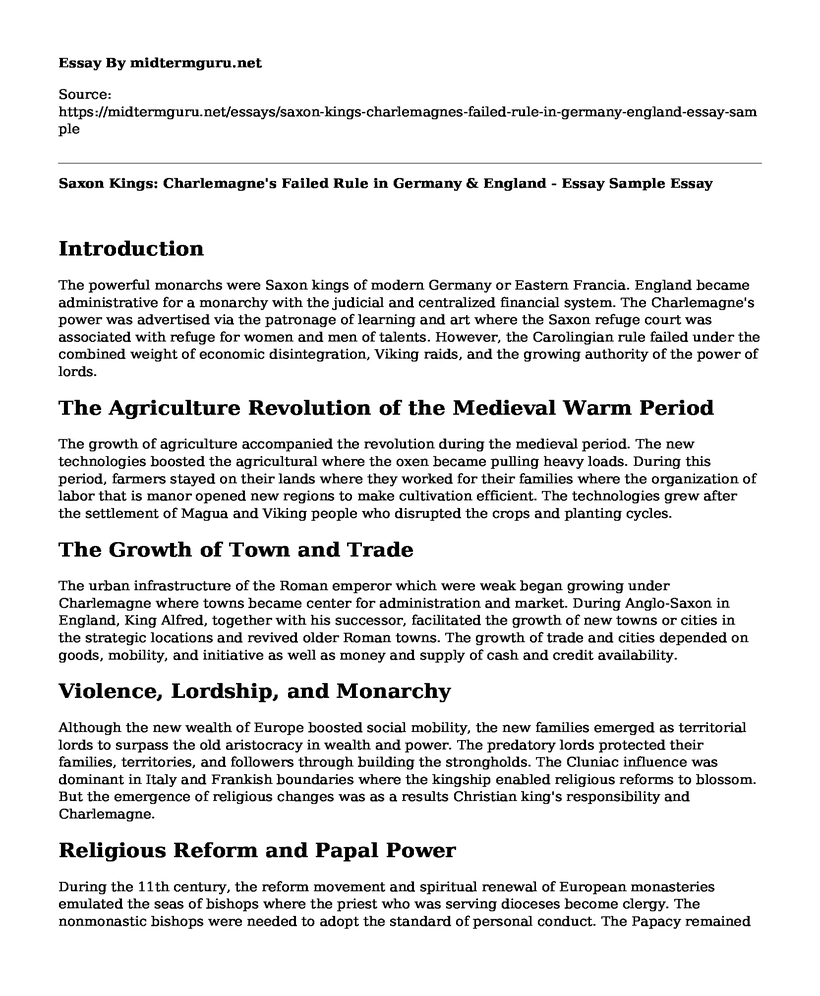Introduction
The powerful monarchs were Saxon kings of modern Germany or Eastern Francia. England became administrative for a monarchy with the judicial and centralized financial system. The Charlemagne's power was advertised via the patronage of learning and art where the Saxon refuge court was associated with refuge for women and men of talents. However, the Carolingian rule failed under the combined weight of economic disintegration, Viking raids, and the growing authority of the power of lords.
The Agriculture Revolution of the Medieval Warm Period
The growth of agriculture accompanied the revolution during the medieval period. The new technologies boosted the agricultural where the oxen became pulling heavy loads. During this period, farmers stayed on their lands where they worked for their families where the organization of labor that is manor opened new regions to make cultivation efficient. The technologies grew after the settlement of Magua and Viking people who disrupted the crops and planting cycles.
The Growth of Town and Trade
The urban infrastructure of the Roman emperor which were weak began growing under Charlemagne where towns became center for administration and market. During Anglo-Saxon in England, King Alfred, together with his successor, facilitated the growth of new towns or cities in the strategic locations and revived older Roman towns. The growth of trade and cities depended on goods, mobility, and initiative as well as money and supply of cash and credit availability.
Violence, Lordship, and Monarchy
Although the new wealth of Europe boosted social mobility, the new families emerged as territorial lords to surpass the old aristocracy in wealth and power. The predatory lords protected their families, territories, and followers through building the strongholds. The Cluniac influence was dominant in Italy and Frankish boundaries where the kingship enabled religious reforms to blossom. But the emergence of religious changes was as a results Christian king's responsibility and Charlemagne.
Religious Reform and Papal Power
During the 11th century, the reform movement and spiritual renewal of European monasteries emulated the seas of bishops where the priest who was serving dioceses become clergy. The nonmonastic bishops were needed to adopt the standard of personal conduct. The Papacy remained unreformed in Rome where Henry 111, the Germany emperor deposed Roman nobles and claimed to be pope. However, the conflicts of investiture were resolved by compromising Concordat of Worms in Germany.
Crusading Causes and Outcomes
The Gregory VII gave the pope the powerful new weapons to conquer against wayward rulers. He insisted that the pope had the authority to judge men, but not himself. Hence, he had the power to offer man freedom about their obligations towards the lord since every Christian owes ultimate pope loyalty as he is the arbiter of death or everlasting life. The expansion of Byzantium succeeded in making enemies in their allies. Thus the preaching in the crusade emphasized that the Christ soldiers are exacted on his opposition in the East.
The Culture of the Muslim West
The increase in social and intellectual contact between the Islamic world and Latin West influenced European music, literature, and learning. The Christian theology was transformed through the Islamic connection where Muslim scholars developed, preserved and inherited the Hellenistic science and medicine and the Aristotle philosophy which formed the basis of new Christian. Poetry developed during the emergence of Muslim culture, which was composed in Arabic, especially Abbasid courts. Hence, the economic, cultural, political and intellectual achievements of Muslim civilization overshadowed by Latin Christian in Europe.
Nature of Western Churches
The Western churches emerged during the reign of Byzantine Emperor. The feudal state and church involved various development where the struggles for authority between popes and kings shaped the Western world. The churches defined the Roman emperor institutions. For example, the kingdom of Constantine claimed tolerance for Christian religion such as apostolic and one holy catholic. Hence, the Greek missionaries converted Balkan Slavs into Orthodox Christianity where it devised the written language which was known as Cyrillic alphabet and Old Church Slavonic.
Reference
Joshua Cole and Carol Symes (2014). Western civilization: Their History & Their Culture. Norton and New York Company in London volume 1: 19th edition.
Cite this page
Saxon Kings: Charlemagne's Failed Rule in Germany & England - Essay Sample. (2023, Jan 24). Retrieved from https://midtermguru.com/essays/saxon-kings-charlemagnes-failed-rule-in-germany-england-essay-sample
If you are the original author of this essay and no longer wish to have it published on the midtermguru.com website, please click below to request its removal:
- Review of Roanoke the Abandoned Colony - Paper Example
- Inauguration Rhetoric Analysis of Donald Trumps - Paper Example
- Questions on Public Service and Totalitarianism - Paper Example
- Essay Sample on President Truman's Veto of the McCarran-Walter Act
- Essay Sample on Abraham Lincoln as a Reflection of Culture and the Time He Existed
- HITECH: Promoting EHRs to Improve Quality and Safety - Research Paper
- Paper Example on Multiculturalism







